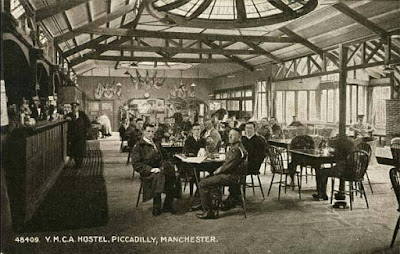Now recently I came across one of those fascinating links that connected my current city of Manchester with where I grew up in Peckham on Lausanne Road.
And the connection was a Mr George Dansie of Barforth Road Peckham and a picture postcard he sent from Manchester in the November of 1917.
The card was of the Manchester YMCA in Piccadilly which was a temporary wooden building erected in the grounds of what had once been a hospital.*
It was also known as the Khaki Club and although meant for soldiers recuperating from wounds and shell shock was open to any servicemen and became a popular club.
I have yet to find out what Mr Dansie was doing in Manchester but given that he had been born in 1890 it is more than likely that he was stationed in the city.
There are a few men with his name in the military record and one in particular who was in the Royal Army Service Corps could be him.
Sadly George doesn’t give too much away in his message home.
He writes that he “will be writing a letter to you tomorrow” and that he had been to two theatres last week and was planning to visit another.
But what caught my eye was a sentence he added as an afterthought and squeezed into the top of the card where he wrote that the Manchester YMCA “is very like the Camberwell hut.”
And that took me on a journey which ended with the Camberwell hut or at least a painting of the building.
The picture is in the collection of the Southwark Local History Library and Archive and according to the background notes was painted in 1917 by "the artist Russell Reeve who was born in Norfolk and lived in Hampstead.
He studied at the Slade School of Fine Art and the Royal Academy of Art.
In 1916 permission was granted for the building of a YMCA hut on Camberwell Green for the use of passing troops."
The Camberwell building is not unlike its Manchester companion and leaves me wondering what its fate might have been.
I don’t remember it but then we left Peckham for Eltham in 1964.
The Manchester YMCA was demolished sometime around 1920 when the site was turned into a public park.
So the hunt is now on to discover more of the history of the “Camberwell hut.”
Location; Manchester, Peckham and Camberwell
Pictures; YMCA Hut on Camberwell Green, 1917 Russell Reeve, GA0325, courtesy of Southwark Local History Library and Archive, the Manchester YMCA postcard from the collection of David Harrop and the picture of the interior from the collection of Bill Sumner
* Piccadilly Gardens ....... the early years nu 1 The YMCA Hostel 1917,
** Southwark Local History Library and Archive
 |
| George writes home, 1917 |
The card was of the Manchester YMCA in Piccadilly which was a temporary wooden building erected in the grounds of what had once been a hospital.*
It was also known as the Khaki Club and although meant for soldiers recuperating from wounds and shell shock was open to any servicemen and became a popular club.
I have yet to find out what Mr Dansie was doing in Manchester but given that he had been born in 1890 it is more than likely that he was stationed in the city.
There are a few men with his name in the military record and one in particular who was in the Royal Army Service Corps could be him.
 |
| The Manchester YMCA, 1917 |
He writes that he “will be writing a letter to you tomorrow” and that he had been to two theatres last week and was planning to visit another.
But what caught my eye was a sentence he added as an afterthought and squeezed into the top of the card where he wrote that the Manchester YMCA “is very like the Camberwell hut.”
 |
| The Camberwell YMCA, 1917 |
He studied at the Slade School of Fine Art and the Royal Academy of Art.
In 1916 permission was granted for the building of a YMCA hut on Camberwell Green for the use of passing troops."
The Camberwell building is not unlike its Manchester companion and leaves me wondering what its fate might have been.
 |
| Interior of the Manchester YMCA, 1917 |
The Manchester YMCA was demolished sometime around 1920 when the site was turned into a public park.
So the hunt is now on to discover more of the history of the “Camberwell hut.”
Location; Manchester, Peckham and Camberwell
Pictures; YMCA Hut on Camberwell Green, 1917 Russell Reeve, GA0325, courtesy of Southwark Local History Library and Archive, the Manchester YMCA postcard from the collection of David Harrop and the picture of the interior from the collection of Bill Sumner
* Piccadilly Gardens ....... the early years nu 1 The YMCA Hostel 1917,
** Southwark Local History Library and Archive




